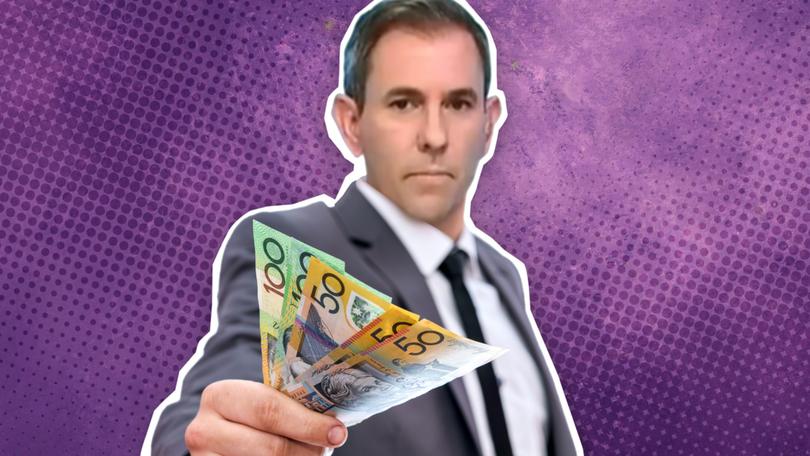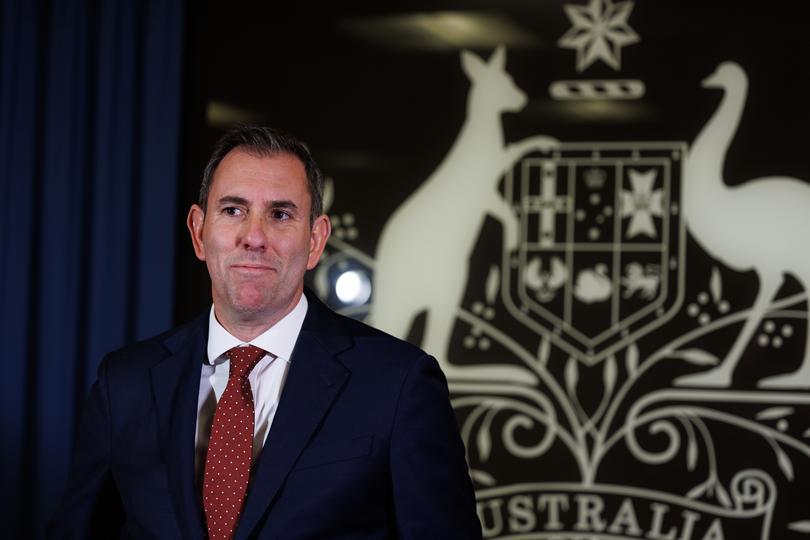DAVID KOCH: It’s time for Treasurer Jim Chalmers to step up and take responsibility for inflation, economy
DAVID KOCH: Jim Chalmers, man up and take responsibility. You’re the Treasurer. Stop blaming everyone else. You control all the financial levers to drive the economy.

Jim Chalmers, man up and take responsibility.
The economy has slowed to a crawl. Because of you.
Interest rates are staying higher for longer. Because of you.
Sign up to The Nightly's newsletters.
Get the first look at the digital newspaper, curated daily stories and breaking headlines delivered to your inbox.
By continuing you agree to our Terms and Privacy Policy.Australian families are hurting from a cost-of-living crisis. Because of you.
There is a housing and rental affordability crisis. Because of you (and the other levels of government which didn’t plan properly for the current population boom).
You’re the Treasurer. Stop blaming everyone else and stop trying to constantly be the good guy. You’re the man. You control all the financial levers to drive the economy, change business conditions and influence every Australian’s household budget.
You’re earning a record amount of personal income tax revenue from all of us but what are you doing with it? You’re spending it. That’s the problem.
Wednesday’s national accounts figures showed the slowest economic growth (outside of pandemic lockdowns) since the last recession in the 1990s — 0.2 per cent for the June quarter and a measly 1 per cent for the year.
Household spending is at record lows but government spending is at an all-time high. About the same level as the economic stimulus during COVID.
Reserve Bank governor Michele Bullock has every reason to be pissed with you. So don’t go hanging her out to dry. The RBA is fighting inflation with the only instrument it has —interest rates.
Meanwhile, you have dozens of instruments that could fight inflation. The infuriating thing is you’ve used a number of them to fuel inflation rather than fight it. That’s the reason why the RBA has had to keep rates higher for longer.
Back in April in this column, I wrote about how Ms Bullock basically apologised for having to raise rates to fight inflation, acknowledging interest rates are a blunt economic instrument that has a massive impact on average Australian families. But it is the only instrument available for the RBA to use. Monetary policy is using interest rates to adjust the speed of an economy.
But there are a myriad of other inflation-fighting instruments in the hands of the Federal Treasurer to help. It’s called fiscal policy and it’s where the Government uses budget measures to impact the economy, cutting government spending to slow the economy or increasing government spending to speed it up. Or it can increase taxes to slow an economy or cut taxes to stimulate economic growth.
At the time I challenged the Treasurer to stop being the “good guy” by promising everyone a pay rise (which adds to inflation which then forces the RBA to lift interest rates) and to instead use his fiscal policy financial muscle to help the RBA fight inflation without raising interest rates or, at the current stage of the cycle, having to keep them higher for longer.

And that’s the root of the problem, the Treasurer wants to be everyone’s friend. But we need an economic reformer who has to be able to make tough, unpopular decisions in the interests of the future of the economy.
Take May’s Federal Budget, which is forecasting a $28 billion deficit for the current financial year after delivering close to a $20 billion surplus in the last financial year. That 2023-24 surplus was bloated by high iron ore and coal prices, which have since come down significantly, and strong corporate and personal tax revenues.
But even factoring in the slide in iron ore and coal prices (which are projected into this Federal Budget) a deficit clearly adds to inflation. The message from the Reserve Bank is all Australian households need to tighten their purse strings and cut spending in the fight against inflation.
The Government and the Treasurer do exactly the opposite. The Federal Budget is forecast to spend $28 billion more than the Treasury is earning. It’s stimulating the economy which means the RBA has to keep interest rates higher to dampen it.
Then there are the current big drivers of the CPI basket: rents, building costs and the services sector. All of which are being driven by the actions, or inactions, of the Federal Government.
While post-pandemic supply chain issues have been largely resolved, home building costs have risen dramatically largely because of a shortage of labour and the rising costs to attract workers to the industry. Ask anyone in the building sector and they’ll tell you Federal and State governments have been sucking workers out of home building and into their massive infrastructure and renewable energy projects.
Those big-spending, big-paying projects are creating the labour shortage which, in turn, pushes up home building costs, adds to inflation and keeps interest rates high.
It’s a similar story when it comes to skyrocketing rents. The Federal Government, quite rightly, reintroduced a strong post-pandemic immigration program but then failed to plan the logistics. Where will they be housed?
Australia needs to build 250,000 new houses a year to keep the property market in balance. We’re currently building fewer than 200,000 and building approvals are at 10-year lows. The ripple effect is higher property prices and a shortage of rental stock which pushes rents up. All because the Federal Government didn’t plan the migration policy properly.
As for what the RBA calls the “stickiness” of the rising costs in the services sector, that all stems from rises in wage costs set by Government recommendations to the Fair Work Commission.
The bottom line is high interest rates are needed to fight inflation but are wreaking havoc through Australian households and sending us into economic recession.
Interest rate cuts will only come when we beat high inflation. That’s why the Treasurer has to stop blaming the RBA and join the fight.
